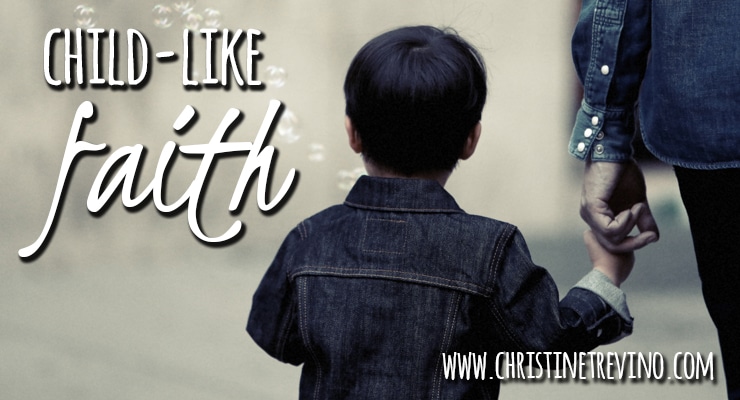Child-Like Faith

Now faith is the assurance of things hoped for, the conviction of things not seen.
Hebrews 11:1 (NASB)
Sometimes it feels like faith gets a little more complicated as we age.
Life has this funny way of bleeding out its true colors with each passing year. Relationships are broken. Dreams go sideways. Finances and security ebb and flow and the comfortable world in which we live can become more chaotic and painful—more sinful even—than we ever remember it being.
At least it’s felt that way to me.
What happens to faith then—when it’s tested and tried by the realities of life?
This is one of those spiritual lessons that’s continued to resurface over and over again for me in the last several years. How my faith coexists with the complexities of real life—not just as a casual addition to Sunday morning—but how it’s implemented in the events of my day-to-day reality.
On the day my husband lost his job.
On the day I have to pay bills on a budget that is far from balanced.
On the day I can’t see straight because the kids have been up all night. Again.
On the day we found out my mom had cancer.
These are the days faith gets complicated.
See, it’s not just theory anymore, and it’s no longer the moral of a nice Bible story I read to my kids at night. In these moments conviction and reality collide—and faith becomes a choice that needs to be made.
Will I take God at His Word?
Will I believe that He will meet my every need?
Will I trust that He is enough?
I know I’m not the only one. Everyone’s faith is eventually challenged.
As I’ve watched friends and family walk very difficult roads—as we have journeyed over rough spiritual terrain ourselves—I’ve noticed the challenges are either what draw us closer to the Lord, or push us further away from Him. Faith either propels us toward new strength in Christ or it slips quietly away through the brokenness of our heart. Faith grows or fades, it never simply stays the same.
So how do we hold tight to faith when it’s tested?
Jesus’ comments to His disciples at the beginning of Matthew 18 have always intrigued me. When His disciples come to Him asking who the greatest in the kingdom of heaven will be, Jesus pulls aside a child and speaks very pointedly to His followers.
This. This is how you enter the kingdom of heaven. By becoming more like a child.
I can picture the disciples, curious and confused, absolutely perplexed at what Jesus is trying to say.
So . . . You want us to become child-ish?
No friends. Jesus wants us to become child-like.
I’ve learned so much about the simplicity and sincerity of faith by watching my kids.
Not one time have I heard them wondering among themselves if they’d be able to get their baseball cleats, or if their favorite foods would be in the fridge on grocery day. They’ve never worried who would take care of them if they get sick. They’ve never considered there might be a question we don’t have the answer to, or that we couldn’t handle their broken heart, their brotherly disagreements, or their skinned knees.
They trust so implicity in our abilities as parents—fallible, human, imperfect parents—to provide for them, the thought that something important would be missing in their lives never once has crossed their little minds.
I am so grateful.
And at the same time I am so humbled.
If you then, being evil, know how to give good gifts to your children, how much more will your Father who is in heaven give what is good to those who ask Him!
Matthew 7:11 (NASB)
God calls Himself Father.
A Father who loves to give good gifts to His children.
A Father who knows the very needs of our heart before we can even whisper them out loud.
A Father who clothes the lilies of the field, and feeds the birds of the air, and says I am so much more valuable to Him than they are.
A Father who invites me to become like a child.
Coming under His authority, protection, and favor. Allowing me to surrender the stresses and worries of my life over to Him, so I can be free from the weight they hold over my heart. Offering me His ability, His track record of faithfulness, His enough-ness as permission to let go, and let Him take all the responsibility and fall-out because He’s my Dad and I’m His kid.
This is what I’m trying to remember when faith feels complicated and reality challenges my conviction.
I have a pretty capable Father, and I can come to Him with the faith of a child.
His child.
And that will always, always be enough.